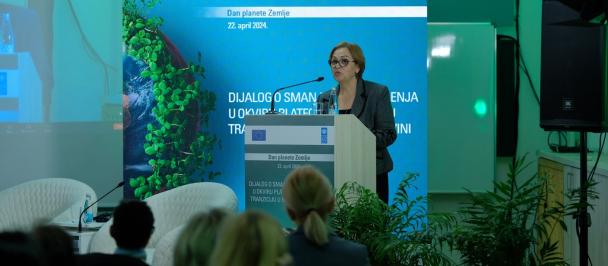Michel Kazatchkine, the Special Advisor to the Joint UN Programme on HIV/AIDS for East Europe and Central Asia
Country visit by Michel Kazatchkine, the Special Advisor to the Joint UN Programme on HIV/AIDS for East Europe and Central Asia, with representatives of UNDP and the Global Fund to Fight AIDS, Tuberculosis and Malaria
International funding from the Global Fund to Fight AIDS, Tuberculosis and Malaria is ending this year. Bosnia and Herzegovina can remain a country with the lowest HIV rate in Europe and sustained reduction of tuberculosis levels only if full implementation of transition from international funding towards sustainable domestically-owned HIV and TB responses is ensured.
Professor Kazatchkine highlighted the importance of coordinated efforts of relevant domestic health, drug control, justice, legislation and other institutions and CSOs in all meetings including with the State Minister of Civil Affairs, entity and cantonal ministers of health, and representatives of civil society organizations involved in HIV and tuberculosis response. He also emphasized that full implementation of domestically-owned transition plans is an imperative to sustain the current low rates of HIV and sustained reduction of tuberculosis levels as international funding from the Global Fund will no longer be available to Bosnia and Herzegovina. He also added that the commitment expressed by domestic partners assures him that the country is able to achieve the set goals however there is a strong urgency to sustain current results and services moving forward.
“The visit is especially timely given the ongoing budgetary discussions to ensure commitment by the authorities and keep Bosnia and Herzegovina a low prevalence country”, said Sezin Sinanoglu, UN Resident Coordinator and UNDP Resident Representative.
The UN system and UNDP remains committed to supporting the transition to more domestic funding sources for continued access to equitable HIV and TB-related services especially for key populations at higher risk of HIV and people living with and affected by HIV. This will be crucial from the perspective of supporting the development of enabling legal, regulatory and policy environments, addressing stigma and discrimination towards key populations at higher risk of HIV and people living with and affected by HIV, and ensuring access to essential prevention, treatment and care services thereby contributing to the achievement of the Sustainable Development Goals and leaving no one behind.

 Locations
Locations



